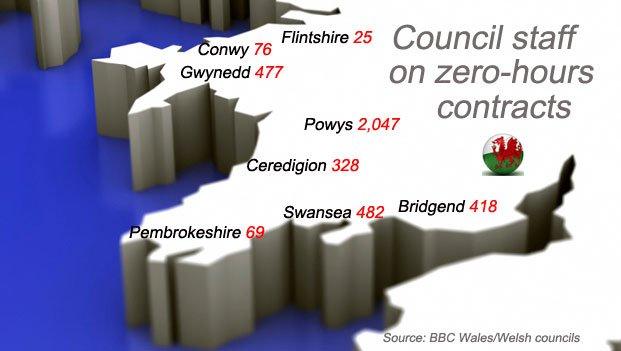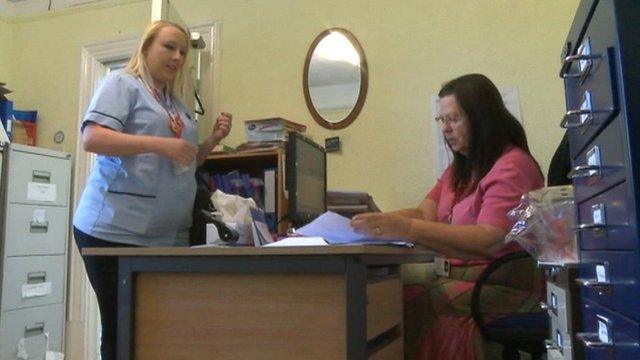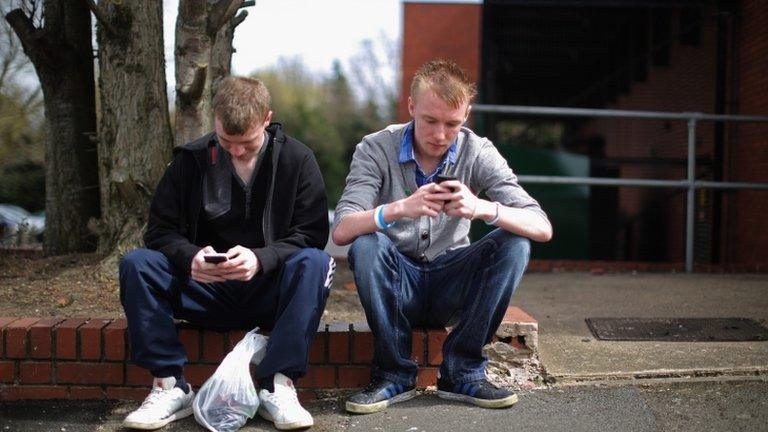Union concerns over council staff zero-hours contracts
- Published

The number of staff on zero-hours contracts is nearly 4,000 across Welsh councils
Too many councils are employing staff on contracts with no guarantee of minimum hours, the union Unison claims.
Eight of the 22 Welsh councils are currently using zero-hours contracts, research by BBC Wales has found.
Nearly 4,000 people are directly employed on the contracts by Welsh councils, with Powys council the biggest user of them.
The councils say the contracts often suit employees, and staff still get benefits like sick pay and paid leave.
Powys council, which is run by a group of independents, employs 2,047 people on zero-hours contracts. It currently has 4,714 full-time equivalent (FTE) staff.
Labour-run councils Bridgend and Swansea have 418 and 482 staff respectively on zero-hours contracts respectively. Bridgend has a total of 5,164 FTE staff, Swansea has 10,330.
Plaid Cymru-led councils Gwynedd and Ceredigion have 477 and 328 staff on zero-hours contracts respectively. Gwynedd has a total of 6,639 FTE, Ceredigion has 2,818.
The figures obtained by BBC Wales do not include people employed on zero-hours contracts by organisations contracted by councils.
Both Labour and Plaid have been vocal about the misuse of zero-hours contracts.
In April the Labour leader Ed Miliband said the contracts were "incompatible with building a loyal, skilled and productive workforce".
Plaid Cymru has consistently called on the Welsh government to ban councils from using the contracts within the social care sector.

Case study - Janine Pugh, a carer for eight years, who works with children and adults.
Carer Janine Pugh says her zero-hours contract gives her flexibility but she needs to plan
Janine Pugh, who works for Crossroads Care Cwm Taf in Pontypridd, said her zero-hours contract works for her.
"I can work as much as I want or as little as I want," she said.
"The flexibility is great because I never miss my son or my daughter's appointments at school which is fantastic.
"But then planning long term if I want a new kitchen next year is hard because it's not a guaranteed wage."

Dominic MacAskill, head of local government at Unison, said Labour and Plaid Cymru should set an example and "put their policies into practice" in the councils they run.
"There's a general insecurity and that is because you don't know from one day to the next how much work you're going to have, how much money you're going to have a month, can you manage to pay your mortgage , can you manage to do your housekeeping," he said.
"There's also the impact on the work-life balance because you have to respond at short notice in order to take work and there's also the fear that if you don't say yes to work that you won't get the call offering work in the future."
"And there's also the issue about the quality of the service.
"You get a higher turnover with zero-hours contracts and also a fear of criticising the service because criticism could again lead to the call not coming and you not getting work."
Dominic MacAskill from Unison says uncertainty is bad for workers
Labour said it was committed to improving the rights of workers on zero-hours contracts, while Plaid said it was working with trade unions to end their use.
The Welsh Local Government Association, which represents councils, said council which use zero-hour contracts continued to ensure staff retained equivalent pay grading and benefits such as sick pay and annual leave.
They also allow staff to work elsewhere outside of their substantive roles or give them an opportunity to get further work experience in a new field.
Councillor John Powell, cabinet member for employment services in Powys, added: "Employees are not penalised in any way and we recognise their statutory entitlements to both sickness and holidays."
- Published10 September 2014

- Published1 April 2015

- Published5 August 2013
